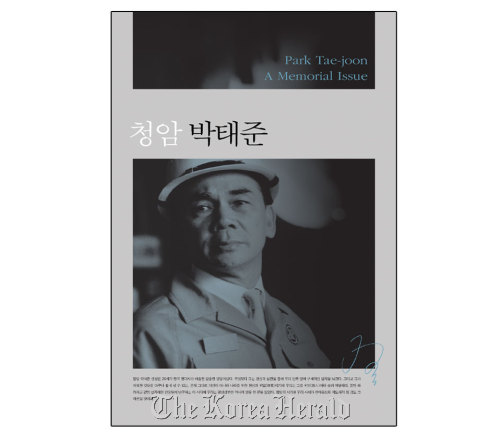
Park Tae-joon:
A Memorial Issue
(ASIA Publishers)
ASIA, a bilingual quarterly which mainly features works of Asian literature, has dedicated its latest issue to the late POSCO founder Park Tae-joon.
Park, who died of complications of lung disease last year, is considered one of the pioneers behind Korea’s post-war economic growth.
The former general who participated in the Korean War (1950-1953) founded POSCO in 1968, which was then called Pohang Iron and Steel Company, and turned it into one of the largest steel companies in the world. He is often referred as the “King of Steel,” and “Andrew Carnegie of Korea.”
The issue, which also includes English translations of articles written in Korean, features a total of six articles on Park’s life and his legacy.
Among the six articles is a tribute essay by celebrated novelist Jo Jung-rae, which was initially published in the Joongang Ilbo last year, shortly after Park’s death in December. “He was the first ― and remains the only ― businessman to provide housing for all of his workers, as well as scholarships through college for our children,” he writes in the essay.
“We have lost a great light, the kind of star that might shine once in a hundred years.”
Meanwhile, Director of Scholarly Research at Korea Future Studies Association Jun Sang-in wrote it would be a mistake to simply call him the “King of Steel,” because Park’s legacy also includes his philosophy and spirit.
“The spirit that runs through his varied career is that of service,” he wrote. “Service to his country, service to his people. Whether in steelmaking, in education, or in urban development, he labored always with the interests of his nation at heart. And the interests of the nation, for him, were always tied up with the welfare of the people.”
Yonsei University’s professor emeritus Song Bok’s article, “A Study of Taejoonism as a Principle,” on the other hand, explores Park’s life and his achievement with the term “Taejoonism.”
“There is Thatcherism in England and Reaganism in the United States,” he writes. “Can Taejoonism be a school of thought, a system of knowledge, a way of thinking, or a mode of execution that is generally and willingly accepted and communicated?”
Song says that it is possible, delving into how Park was exceptional in his leadership and attitude towards work. Some of the qualities of Park that Song stresses are his “refusal to accept impossibility,” and “patriotism” which he argues is the key factor that helped turn Korea into today’s industrial powerhouse.
The quarterly, which was founded in 2006, is published by POSCO TJ Park Foundation. The institute, which is named after Park, has been working on various projects to support Asian authors and scholars and their work, including the POSCO ASIA Fellowship, the POSCO TJ Park Prize, and the POSCO Regional Scholarships.
(dyc@heraldcorp.com)





![[Graphic News] Number of coffee franchises in S. Korea rises 13%](http://res.heraldm.com/phpwas/restmb_idxmake.php?idx=644&simg=/content/image/2024/05/02/20240502050817_0.gif&u=)



![[Robert J. Fouser] AI changes rationale for learning languages](http://res.heraldm.com/phpwas/restmb_idxmake.php?idx=644&simg=/content/image/2024/05/02/20240502050811_0.jpg&u=)







![[Eye Interview] 'If you live to 100, you might as well be happy,' says 88-year-old bestselling essayist](http://res.heraldm.com/phpwas/restmb_idxmake.php?idx=652&simg=/content/image/2024/05/03/20240503050674_0.jpg&u=)
